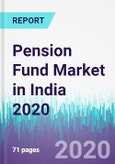The retirement fund corpus was worth ~INR 25,078 Bn in 2018 and is expected to reach INR 62,353 Bn by 2025, expanding at a compound annual growth rate of ~14.33 % during the 2020-2025 period.
The Indian government is restructuring the current pension system by promoting pension coverage among informal sector workers. The collected retirement fund corpus is invested in long-term growth projects, which accelerates the pace of economic development of the country.
The country’s pension industry is highly underpenetrated as ~88% of the population does not possess any social security scheme, which indicates that the market has huge growth potential.
Market Segment Insights:
The retirement fund corpus is inclusive of contributions from Employee Provident Fund and related plans, Life Insurance and Annuity schemes, Private Pension Fund, Public Provident Fund, and the National Pension Scheme.
More than 40% of the current corpus is contributed by Employee Provident Fund, the most developed segment of retirement planning for the organized sector workforce. However, contributions from Life Insurance and Annuity plans are expected to grow significantly during the forecast period. With increasing financial inclusion, the market for Public Provident Fund and National Pension Scheme would expand exponentially, especially among those employed in the unorganized sector.
Impact of COVID-19:
The impact of the pandemic on the Indian pension fund market is likely to intensify in the long run. The government has redesigned the interest rate, which is expected to diminish private savings and pension fund assets. Further, several policy decisions to support pension fund subscribers during the crisis period are expected to add to the problem of accounting and returns for industry players.
Companies Covered::
- HDFC Life Insurance Company Limited
- Aviva Life Insurance Company India Limited
- Aditya Birla Sun Life Pension Management Limited
- HDFC Pension Management Company Limited
- ICICI Prudential Pension Funds Management Company Limited
- LIC Pension Fund Limited
- Reliance Nippon Life Insurance Company Limited
- SBI Pension Funds Private Limited
- Tata AIA Life Insurance Company Limited
- UTI Retirement Solutions Limited
Table of Contents
Companies Mentioned
- HDFC Life Insurance Company Limited
- Aviva Life Insurance Company India Limited
- Aditya Birla Sun Life Pension Management Limited
- HDFC Pension Management Company Limited
- ICICI Prudential Pension Funds Management Company Limited
- LIC Pension Fund Limited
- Reliance Nippon Life Insurance Company Limited
- SBI Pension Funds Private Limited
- Tata AIA Life Insurance Company Limited
- UTI Retirement Solutions Limited








